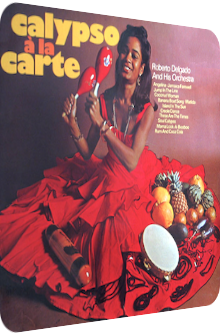
Roberto Delgado
Calypso A La Carte
1970
Ah, Calypso, the somewhat ostracized style in the world of Exotica. While it evokes the smell of rum and the bustling streets of Haiti, its focal point lies elsewhere. Polynesia is the preferred destination! There is the occasional Calypso vestibule to the isles of Exotica, and there are naturally well-known composers and arrangers who try to overcome the looming omnipresence of Jamaica Farewell and consider other gems as well, but unfortunately less successfully so. Leo Addeo’s Calypso (1964) lacks the true soul of a good steelpan and is severely outshone by late classics such as 1973’s Steel Vibrations by Amral’s Trinidad Cavaliers Steel Orchestra.
So how does marimbaphonist and composer Roberto Delgado fare in these waters? Born Horst Wende (1919–1996), he encapsulates typical German mannerisms of the 60’s and 70’s in his music, that is copying the styles and latest trends in the United Kingdom and embellishing them with brass-heavy ornaments. Ack van Rooyen and Manfred “Fred” Moch reprise their roles as trumpeters, and together with a few session musicians and related personnel, they create Calypso À La Carte, a 12-track LP released in 1970 on Polydor, harboring all your favorite sunny classics. Flutes, bongos, acoustic guitars, everything is on board alright; three tracks even feature uplifting shouts and whatnot. There’s the usual problem though: the heart and soul of Calypso – whatever they mean to the respective listener – are not easily transferred by Easy Listening orchestras, even though their joyous melodies make them so seemingly compatible. The recording technique, however, has improved. Here’s a closer look at Roberto Delgado’s interpretation of a good Calypso.
What many of Roberto Delgado’s albums are lacking is plasticity, the natural reverb, the crunchy decay of each instrument. Not so Calypso À La Carte. Its opener Angelina differs right from the get-go. Originally composed by Irving Burgie, the sun-dappled mood is augmented by the natural verve of the marimba. Even Fred Moch’s trumpet protrusions fit perfectly well, as do the backing layers of brass, accordions and frilly flutes. The punch of the drums is equally potent, a quality that runs like a golden thread through the album. Jamaica Farewell by Lord Burgess meanwhile succumbs to a mountainous acoustic guitars hued in sunset and driven by a laid-back mélange of mucoid brass layers, with Raymond Bell’s Jump In The Line boosting the tempo and vivacity via handclaps, horn fanfares, laughter and viscid marimba aortas. The staged shouts and chants are unnecessarily chintzy, but something’s got to give, even though the listener receives more than he actually wants.
Irving Burgie is considered once more: These Are The Times is a high noon hammock serenade of polylayered flutes and Ack van Rooyen’s drowsy trumpet rivulets, whereas Isaac Blackman’s and Kasey Phillips’ Soul Calypso basks in trumpet hydrazines, hidden wah wah guitar chords and a bongo-accentuated percussion pericarp. The marimba is particularly moist here. Harry Belafonte’s Mama Look-A-Booboo rounds off side A with bongos straight out of a rain forest and another performance of the laughing band members. The jungle-like tremolo of the flute rescues the success of the party.
Side B is hued in sunshine as well. Rum And Coca Cola by Jeri Sullivan, Morey Amsterdam and Paul Baron repeats the Calypso formula and sees Roberto Delgado unleash Haitian flutes amidst German brass prowess, with the marimba mediating between the two worlds. Harry Belafonte and Lord Burgess are considered another time with Island In The Sun, ostensibly one of Delgado’s favorite ditties, as it appears on many albums. This rendition is surprisingly mellow and replaces technicolor for limewashed haze, evoking a cavernous but tasteful cove that is driven by prolonged brass melodies and deep bass guitars.
While Roberto Delgado’s own Creole Dance is supercharged with the usual array of screams, chants and shout-outs in-between rhythm guitars and marimba punctilios, the team Belafonte/Burgess is a force to reckon with again and again as Coconut Woman shows. The bumblebee brass layers gyre around the maraca rivulets, the marimbas interpolate the warmth of the tropics. The touristic Banana Boat Song then is the sun-coated pinnacle of Belafonte’s power of catchy harmonies, with the finale returning to another girl, Norman Spann’s Matilda and her galloping beat structure plus high-rise flutes. All those “Matilda” chants are a nice nod towards Pérez Prado, for whatever that’s worth.
Calypso À La Carte can be seen as an improvement of Roberto Delgado’s standard formula that hasn’t aged well, but still enshrines a bit of languor here and there. This has less to do with the array of instruments that remains the same throughout his releases of the 60’s and early 70’s and more with the way he arranges these patterns. Indeed, something has changed this time, and whether it has something to do with a better studio, another engineer or a new concept in Polydor’s recording technique is up for debate, but ultimately moot. While I am as happy as can be about good sound quality, I’m by no means an audiophile.
Having said that, even I notice that Delgado’s material suddenly breathes and lives when the wideness increases. This assertion is not based on the Calypso style, it solely has to do with the better balance of the ingredients. The drums, for instance, are high-octane, and in tandem with the multitudinous brass layers they offer a vivid liveliness on the one hand and – probably even more importantly so – annihilate the creepy and ultimately wrong feeling of listening to a MIDI-based album by a faux-band. Those who adore the Calypso style are better off with the truthful kaleidoscopes by Harry Belafonte or should otherwise consider Josephine Premice’s excellent Caribe (1957) with a young Barney Kessel on the guitar. Calypso À La Carte is available on vinyl, as a download and on streaming services.
Exotica Review 461: Roberto Delgado – Calypso À La Carte (1970). Originally published on Nov. 28, 2015 at AmbientExotica.com.
